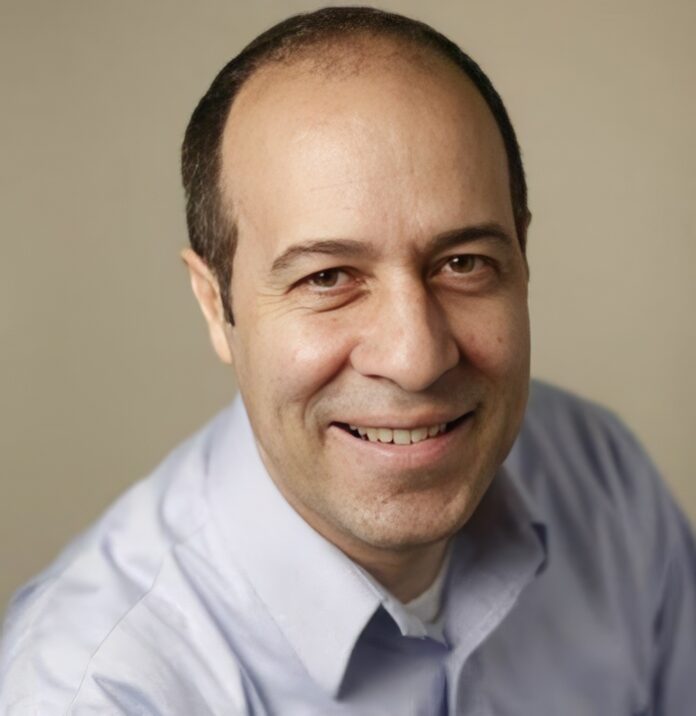Daniel Aharonoff and I spent over six hours in conversation over the course of a couple of weeks, but we only scratched the surface of his life story, as well as his business acumen and advice.
Viewing a video online (whether on a phone or computer) is something we take for granted. After all, that’s what the Internet is all about. But things weren’t always that way. When it first began, it couldn’t showcase moving images; everything was text- or image-based. Daniel was at the forefront of online video streaming with his company Videodome, which led to his partnering with NBC, FoxKids and Haim Saban.
Daniel now owns and operates ATM.tv, which owns and manages video ad space above all 7-Eleven ATMs at over 9,000 locations across the United States. Daniel has also become known as an expert and futurist in the world of blockchain and emerging technologies, including artificial intelligence.
We discussed his career, his thoughts on AI for business, and the merits of outsourcing one’s salesforce.
Daniel is responsible for making the shiurim of Rabbi Josh Gordon, z”l, available to the public.
With its ups and down, his career tells the story of someone who utilized his talents to make a difference. Daniel lives in Encino Hills, California, where he is actively involved in his local Chabad shul. Enjoy! —Nesanel
I was born in Pforzheim, Germany, and I am the oldest of five. My great-grandparents escaped from Russia with three girls and three boys and ended up in Afghanistan. One son moved to Kabul, where he got married and my mother was born. Another son went to New Delhi, India, where he got married and my father was born. My parents were cousins, but they had no idea that the other existed.
“My father’s family then moved to Israel. When my father was around 20 years old, my grandfather took him and his siblings to visit the relatives who had immigrated to New York. That’s where my parents met. My father spoke Hebrew, English and German, but my mother only spoke one of the Afghan languages. Nonetheless, they got married.
“The family wasn’t thrilled, but my father’s father said, ‘Learn a trade and then you’ll be in a better position to do this.’ My father learned to cut, polish and sort diamonds. He realized that he could buy diamonds in Antwerp, prep them in Israel, and then sell them in Germany. He set up shop in Pforzheim.
“I would say I grew up Modern Orthodox. My parents grew up with many traditions and figured out a lot of things for themselves, but that didn’t necessarily translate into halachah. It was due to a lack of education, as there weren’t any official Jewish schools.
“Every few months we would drive two hours to Karlsruhe, the nearest city with a kosher butcher, and fill up the car with meat. After a while, they created a shul in our community in an office. My father brought in a rabbi from Israel who became the rav. He gave weekly classes in Judaism.
“After having four children there, my father decided that Germany was not where he wanted to raise his children. His diamond business was doing exceptionally well, and he wanted to expand and move to America.
“I was ten years old when we moved. I didn’t know why we were leaving or where we were going. We were picked up from the airport in a massive limo and driven to our new house in Bel Air. It had 14 bedrooms, tennis courts and a swimming pool.
“I didn’t speak a word of English. I didn’t understand what anyone was saying and I always thought people were talking about me. The level of anxiety I felt was pretty intense. I was in the fourth grade. My siblings and I went to Hillel Hebrew Academy and then to Y.U.L.A high school. For the first few years, we had tutors after school and on Sundays. Everything was different: the language, the culture, the whole mindset.
“The German mindset has no shades of gray. If you have to do something, you have to do it. I have dyslexia, but I didn’t know I had a choice not to do homework. Going to school in America taught me a different lesson: that in the US, you have the option to be lazy. For the rest of my school years, every report card read, ‘If Daniel applied himself he could do better.’ I was a solid C student.
“Up until the mid-1980s our family was blessed in the material sense, and we had lots of friends in high places. My father had worked very hard to achieve success, but too many deals started to go sour, and the attendant legal costs were crippling. We had to sell the mansion in Bel Air and move into a series of smaller and smaller houses. It was a very uncomfortable situation: constant foreclosures, lawyers calling, and sheriffs trying to evict us.
“I started working during the summer to help out. I had no idea what I wanted to do with my life; all I knew was that I would never go into the diamond trade. I enrolled in Cal State University in Northridge because that’s what everyone else did. Then, b’hashgachah pratis, I saw an ad for the Institute of Technology and Engineering (ITT), a trade school focused on engineering and electronics, and transferred to their two-year program for an associate’s degree in electrical engineering.
“All of a sudden, the C student became the valedictorian of his class. I could now do advanced trigonometry, whereas until then math had been my worst subject. I’m a visual learner, and in engineering, I could see things and understand how they worked. I was interested and motivated to apply myself. But navigating social situations didn’t come naturally to me. I had to think, plan and coordinate in order to have a conversation.
“A few years earlier, for my bar mitzvah, I’d received a computer and a video camera, and I taught myself to program and produce content. During my college years I worked at a few software-oriented companies, providing technical support to customers. It paid well, but the downside was that it became monotonous; I was solving the same problem 17 times a day. To combat boredom, I would think about other areas where I could excel. I asked for meetings with the CEO and the president to discuss my ideas about growing the business and new products. My superiors weren’t too happy with me.
“By the time I graduated I had only one job, making $40,000 a year. Then I got laid off. But I didn’t whine; I was driven to learn new things and I wanted to work for a company that was at the forefront of computer software, Quarterdeck Office Systems, which was later bought by Symantec. Some of the most advanced software engineers in the field worked there. I was 21 years old, and my skill set was nowhere close to the level of the others, but I wanted to be a part of it.
To read more, subscribe to Ami





















